

A Conservative Road Map to a Better Academy. A Marxist historian told me sharply some 30 years ago: "The left's decisive advantage is this: We will ‘waste' money on projects for years, decades, in order to raise public consciousness, whereas quintessential Americanism lives and dies tethered to its god of the quarterly profit.
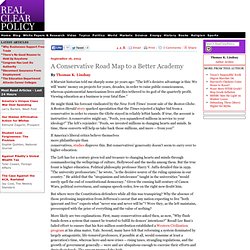
Viewing education as a business is your fatal flaw. " He might think his forecast vindicated by the New York Times' recent sale of the Boston Globe. Blogs - 1st Read. Rovy Branon's Blog. The Learning Circuits Blog. Internet Time Blog. Though Enrolling More Poor Students, 2-Year Colleges Get Less of Federal Pie. WASHINGTON — Community colleges have received a declining share of government spending on higher education over the last decade even as their student bodies have become poorer and more heavily African-American and Latino, according to a report to be released Thursday.
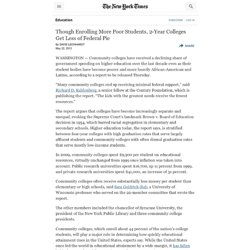
“Many community colleges end up receiving minimal federal support,” said Richard D. Kahlenberg , a senior fellow at the Century Foundation, which is publishing the report. “The kids with the greatest needs receive the fewest resources.” The report argues that colleges have become increasingly separate and unequal, evoking the Supreme Court’s landmark Brown v. Board of Education decision in 1954, which barred racial segregation in elementary and secondary schools. In 2009, community colleges spent $9,300 per student on educational resources, virtually unchanged from 1999 once inflation was taken into account.
High Schools Set Up Community-College Students to Fail, Report Says - Students. By Katherine Mangan Community colleges' academic expectations are "shockingly low," but students still struggle to meet them, in part because high-school graduation standards are too lax in English and too rigid in mathematics, according to a study released on Tuesday by the National Center on Education and the Economy.
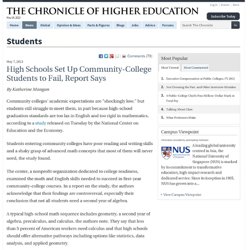
Students entering community colleges have poor reading and writing skills and a shaky grasp of advanced math concepts that most of them will never need, the study found. The center, a nonprofit organization dedicated to college readiness, examined the math and English skills needed to succeed in first-year community-college courses. Debating the Value of College in America. My first job as a professor was at an Ivy League university.
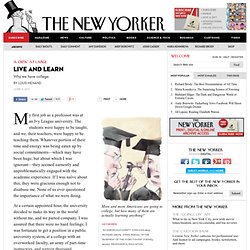
The students were happy to be taught, and we, their teachers, were happy to be teaching them. Whatever portion of their time and energy was being eaten up by social commitments—which may have been huge, but about which I was ignorant—they seemed earnestly and unproblematically engaged with the academic experience. If I was naïve about this, they were gracious enough not to disabuse me. 0902_recession.pdf. Academically Adrift: Limited Learning on College Campuses: Richard Arum, Josipa Roksa: 9780226028569: Amazon.com.
'Academically Adrift' If the purpose of a college education is for students to learn, academe is failing, according to Academically Adrift: Limited Learning on College Campuses, a book being released today by University of Chicago Press.

The book cites data from student surveys and transcript analysis to show that many college students have minimal classwork expectations -- and then it tracks the academic gains (or stagnation) of 2,300 students of traditional college age enrolled at a range of four-year colleges and universities. The students took the Collegiate Learning Assessment (which is designed to measure gains in critical thinking, analytic reasoning and other "higher level" skills taught at college) at various points before and during their college educations, and the results are not encouraging: "How much are students actually learning in contemporary higher education?
The research findings at the core of the book are also being released today by their sponsor, the Social Science Research Council. Academically Adrift Review. Collegiate Learning Assessment. Skeptics. Debating the Value of College in America. Students Avoid 'Difficult' Online Courses, Study Finds - Wired Campus. Many students stay away from online courses in subjects they deem especially difficult or interesting, according to a study released this month by the Community College Research Center at Columbia University’s Teachers College.
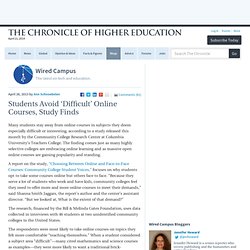
Why online education is mostly a fantasy. By Francisco Dao On April 25, 2013 If you listen to the advocates of online learning, MOOCs and Internet-based courses will cure all of our education problems.
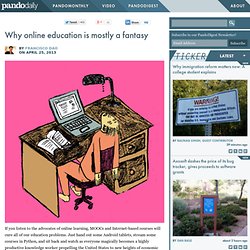
Just hand out some Android tablets, stream some courses in Python, and sit back and watch as everyone magically becomes a highly productive knowledge worker propelling the United States to new heights of economic prosperity. The Journal of Asynchronous Learning Networks (JALN) A Highlight and Note by tomparm from The New Digital Age: Reshaping the Future of People, Nations and Business. A Highlight and Note by tomparm from The New Digital Age: Reshaping the Future of People, Nations and Business. A Note by tomparm from The New Digital Age: Reshaping the Future of People, Nations and Business. A Highlight and Note by tomparm from The New Digital Age: Reshaping the Future of People, Nations and Business. Shared Trees. Thinkers & Thoughts. Bill Gates On Education: "We Can Make Massive Strides" Pop quiz: Is Bill Gates a) the savior of American public education or b) a cloistered billionaire who should stick to something simple like eradicating polio?
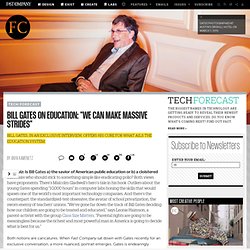
Both views have proponents. There's Malcolm Gladwell's hero's tale in his book Outliers about the young Gates spending "10,000 hours" in computer labs honing the skills that would spawn one of the world's most important technology companies. And there's the counterpart: the standardized-test obsessive, the avatar of school privatization, the sworn enemy of teachers' unions. "We've gone far down the track of Bill Gates deciding how our children are going to be treated and educated," says Leonie Haimson, a parent-activist with the group Class Size Matters.
Both notions are caricatures. "We're stuck at $600 billion a year," Gates notes wryly, referring to the annual amount spent on education in the United States nationwide. News of the Week: Robo-Grading Debate, MOOCs Promoting Peer Collaboration & New Ed-Tech Tool. In this ‘Need-to-Know’ blog post series I share noteworthy stories that speak of need-to-know developments within higher education and K-12 that have the potential to influence, challenge and/or transform the traditional model of education.
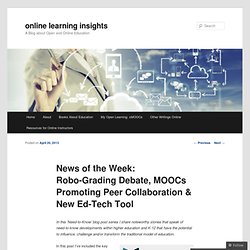
Stanford University launched new MOOC platform NovoEd this week. In this post I’ve included the key developments of this past week that will keep readers in-the-know on education news. Another new MOOC platform, NovoEd launched by Stanford this week offers challenging courses and takes a unique approach to team projects and peer grading, and the machine grading of essays—the debate continues and is an issue that prevents one school from joining edX. Also, I’ll introduce a new tool that bring interactivity to online learning. Laysha Ward: Re-Imagining Learning: Digital and Physical Convergence. Strange as it may sound, we may be witnessing the death of "digital" -- at least as an adjective.

Degreed - The Digital Lifelong Diploma. UK universities face threat from online courses and for-profit colleges – The Guardian. Colleges Curb Adjuncts' Hours to Skirt Affordable Care Act Rules - Faculty. By Sydni Dunn Allison G. Armentrout, an adjunct instructor at Stark State College, doesn't get paid by the hour. She earns $4,600 to teach two English composition courses. But now she carefully tracks how many hours she works on an electronic time sheet. On a recent week, she spent three hours preparing for her lectures, close to six hours in the classroom, and 16 more grading assignments for a grand total of about 25 hours.
Stark State, in North Canton, Ohio, is among a growing number of colleges that have limited the number of weekly hours part-time employees can work to keep them below the level at which employers are required to provide health insurance. Why is Creativity Important in Education? Share this Episode Please select a language: Autoplay End of Video Show End Screen Default Quality.